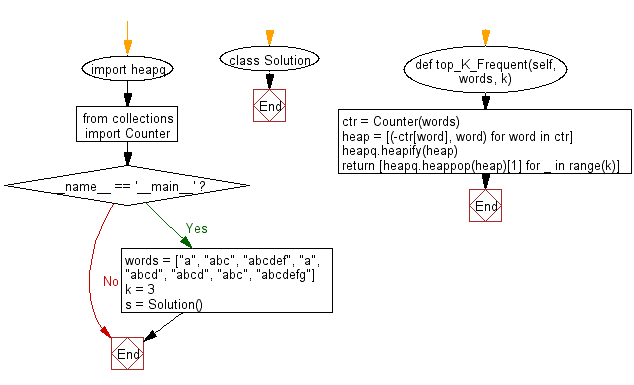Python: Get the k most frequent elements from a given non-empty list of words using Heap queue algorithm
14. K Most Frequent Words
Write a Python program to get the k most frequent elements from a given non-empty list of words using the heap queue algorithm
Note:
Range of k, 1 ≤ k ≤ number of unique elements and input words contain only lowercase letters.
Sample Solution:
Python Code:
import heapq
from collections import Counter
class Solution:
def top_K_Frequent(self, words, k):
"""
:type words: List[str]
:type k: int
:return type: List[str]
"""
ctr = Counter(words)
heap = [(-ctr[word], word) for word in ctr]
heapq.heapify(heap)
return [heapq.heappop(heap)[1] for _ in range(k)]
if __name__ == '__main__':
words = ["a", "abc", "abcdef", "a", "abcd", "abcd", "abc", "abcdefg"]
k = 3
s = Solution()
print("3 most frequent elements:")
print(s.top_K_Frequent(words, k))
Sample Output:
3 most frequent elements: ['a', 'abc', 'abcd']
Flowchart:

For more Practice: Solve these Related Problems:
- Write a Python program to extract the k most frequent words from a non-empty list using a heap and a frequency counter.
- Write a Python script to determine the top k common words in a text using heapq and then output them sorted by frequency.
- Write a Python program to implement a function that returns the k most frequent words from a list and then tests the function with sample data.
- Write a Python function to use heapq to get the top k frequent words and then verify the result by comparing it with a dictionary-based sort.
Go to:
Previous: Write a Python program to find the nth super ugly number from a given prime list of size k using Heap queue algorithm.
Next: Write a Python program to check if the letters of a given string can be rearranged so that two characters that are adjacent to each other are different using Heap queue algorithm.
Python Code Editor:
Have another way to solve this solution? Contribute your code (and comments) through Disqus.
What is the difficulty level of this exercise?
Test your Programming skills with w3resource's quiz.
